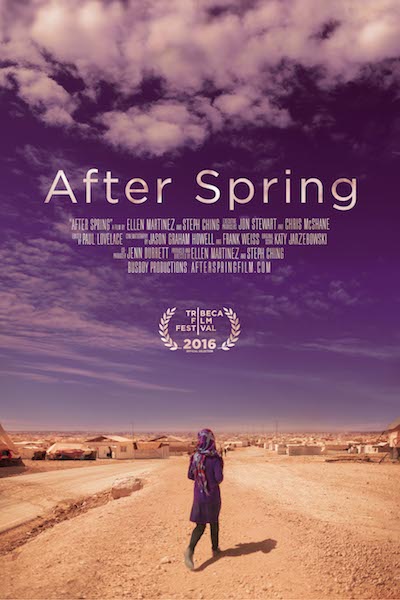“Better to be happy in a hut than crying in a castle” is the English translation of the Arabic proverb framed on a wall of Mohamed‘s caravan in the bulging Zaatari Refugee Camp in Jordan. Eighty thousand Syrians have been relocated to Zaatari—run by the The UN Refugee Agency and located 60 miles from Amman—since their country’s ongoing civil war erupted in 2011.
Mohamed and his family, in addition to another proud and hard-working father named Ibrahim (who describes the camp as “a maze, and you can’t get out”) and his growing brood, plus the camp itself are the subjects of After Spring, an exceptional documentary from first-time feature filmmakers Steph Ching and Ellen Martinez. Martinez’s four years living in Damascus (eight years total in the Middle East) and Ching’s grandmother’s experience as a refugee brought the two young women together to show these tragically displaced people in a warm and graceful light.
According to the documentary, in the past six months or so reality has sunk in for the camp’s residents. Many are resigning themselves to the fact Zaatari might be a much more permanent situation than they’d hoped for, and they are establishing life there as best they can. While “the most beautiful stories are in Syria,” as one refugee describes, 4.6 million people have fled the country so far and made their way out through treacherous, frightening and uncertain conditions. Zaatari’s somewhat of a haven for its inhabitants, who’ve filled its 62,710 square miles with ingrained merchant reminders of home: bakeries, hairdressers, clothing stores, pet shops and more. The contained economy is, for lack of a better word, booming: the main shopping strip is nicknamed the “Champs Elysees” and with over 3000 stores total in the camp, more than 10 million Euros are made per month. Each refugee is allocated one dollar per day for food, which they bring back from Tazweed Supermarket to their districts where they reside in either a trailer or still for roughly 1000 families, a tent.
The Syrian Civil War is an ongoing, multi-sided armed conflict with international interventions. The unrest began in the early spring of 2011 within the context of the Arab Spring protests, with nationwide protests against President Bashar al-Assad‘s government, whose forces responded with violent crackdowns (“we never thought our army was designed to kill its own people,” says Ibrahim in one scene). The conflict caused a huge displacement of the population, with 650,000 Syrians heading over the border into Jordan alone. Half a million live outside the camps and are being called the “invisible population.”
With half of Syria’s refugees being children, the dangers of a “lost generation” loom ahead. Efforts to placate Zaatari’s young people include a Taekwondo academy founded in 2013 by the instantly lovable Korean NGO and Taekwondo master, Charles Lee. Mr. Lee runs classes for boys and girls; he initially speaks to the girls’ hesitant parents to get their permission, and then changes their minds once they see how the sport has built their confidence and as with the boys, “calmed their minds.” None of these efforts would be possible without former camp leader Kilian Kleinschmidt, shown in the documentary overwhelmed with emotion when the Taekwondo students deliver him a tribute performance upon the announcement of his departure.
The UNHCR refers refugees for resettlement and so far less than one percent of Syria’s are resettled. Not since World War II has there been a humanitarian crisis this significant, with so many people displaced, and each refugee in Zaatari up for a visa is given straight talk regarding their chances (for example, if you’re headed to the United States, expect to pay back your airfare within 3-6 months of arriving). Many of the families in Zaatari speak openly about dangerously deciding to return to their homeland. If this eventually takes place, they must give up their asylum seeker documentation and face challenges to be re-admitted to their temporary country should they ever need to return.
Executive produced by Jon Stewart, After Spring is simultaneously a portrait of the dire situation the Syrian refugees are in and a tribute to their resilience. For more information on the crisis and to offer assistance, visit The UN Refugee Agency and the International Refugee Assistance Project.

